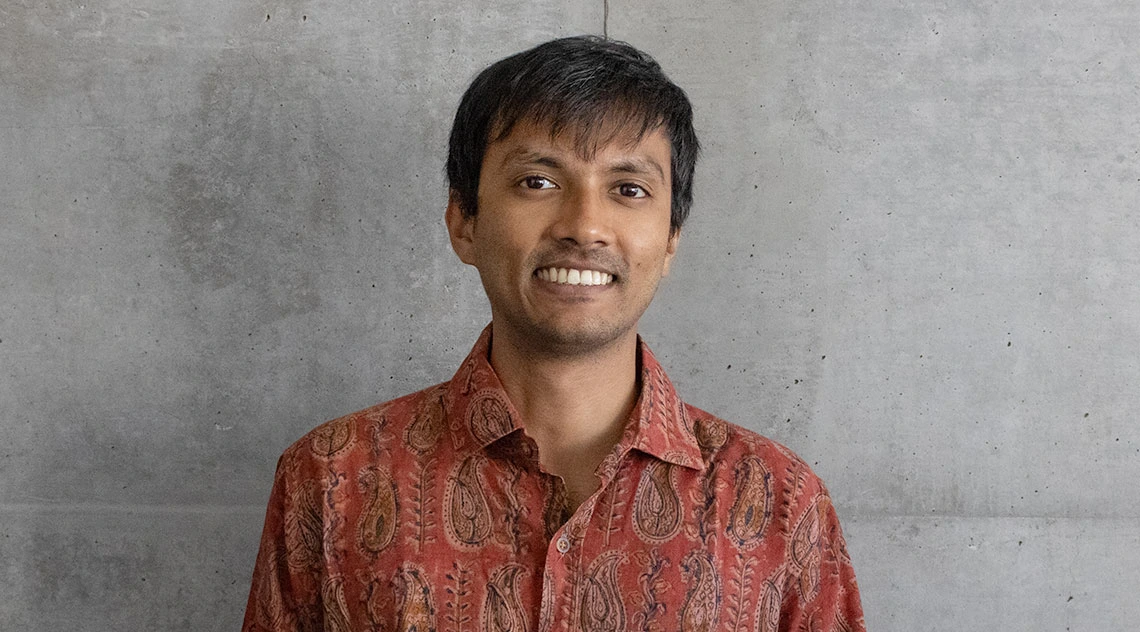Data Science, AI and the International Experience: Kashyap Sai Prasad Nadendla, MSDS ’25
INFOSCI STUDENT PROFILE

Kashyap Sai Prasad Nadendla, MSDS '25, comes to the University of Arizona College of Information Science from Chennai, India, where he earned an undergraduate degree in software engineering.
There are endless opportunities to enhance your skills and gain knowledge in the latest technologies here. Be curious, aim high in your projects and take advantage of the guidance offered by the dedicated faculty and staff at the College of Information Science.
Master of Science in Data Science student Kashyap Sai Prasad Nadendla came to the College of Information Science from Chennai, India, where he earned an undergraduate degree in software engineering. As a student employee at the Institute for Computation and Data-Enabled Insight’s AI Core, he explores the latest advancements in artificial intelligence technology to develop innovative solutions and products
What brought you to the University of Arizona to study data science?
The University of Arizona’s Master’s in Data Science is a distinguished program renowned for its cutting-edge research and esteemed faculty. The program’s commitment to fostering innovation in the field was a significant factor in my decision.
Video of work completed in MSDS program by Kashyap Sai Prasad Nadendla: a 3D depiction of African Savannah elephant ecosystems, using regression models to estimate population trends from 2015-2023, based on data from 1994-2013.
Tell us a bit about your particular area of focus in data science.
My focus lies in natural language processing (NLP), with a keen interest in harnessing the capabilities of algorithms and advanced techniques to address complex problems. The recent advancements in large language models (LLMs) have further deepened my interest in developing applications and solutions that integrate these models with traditional NLP approaches. This area of study excites me because it holds tremendous potential to revolutionize how we interact with and understand language-based data.
What do you like best about the Master's in Data Science program?
The most compelling aspect of the program is its diverse course offerings, which are designed to equip students with practical skills through the development of functional, research-driven projects. This hands-on approach is invaluable in preparing students for real-world challenges.
Video of work completed in MSDS program by Kashyap Sai Prasad Nadendla: chatbot with multi-model integration, including GPT-4o, Gemini, Groq and Mistral, ensuring seamless context across model switches; includes a RAG model using Claude and AWS to retrieve vector-embedded research papers, delivering accurate, context-aware responses.
Tell us about your experience adjusting to your new life in America.
As an international student, acclimating to life in the United States presented initial challenges, particularly in balancing academics with daily responsibilities such as work, assignments and household chores. Time management was a significant hurdle. However, with the support of friends who have been incredibly helpful in sharing responsibilities at home, I have been able to adjust and thrive in this new environment.
What internships and other job experience do you have, and what are your career aspirations?
I am currently employed at AI Core, a student workforce under the Institute of Computation and Data Enabled Insights. At AI Core, we are dedicated to exploring and applying the latest advancements in artificial intelligence technology to develop innovative solutions and products.
Previously, I completed an internship at RChilli, a resume-parsing company based in San Ramon, California, where I developed an application for form-filling automation. This application created vector databases of company documents and utilized OpenAI’s GPT-4 model to answer questions within forms.
My career aspirations include entering the healthcare industry, where I aim to develop impactful technology solutions. Additionally, I have a strong interest in sports analytics and would welcome the opportunity to contribute to that field.
Video of work completed in MSDS program by Kashyap Sai Prasad Nadendla: an educational platform for children with learning disabilities, using interactive activities to teach words and meanings; integrated with text-to-speech, text translation and a chatbot to generate child-friendly images in a unique art style for enhanced learning.
Outside of school, what are your passions?
One of my greatest passions is hiking, particularly in remote and picturesque natural environments. I enjoy challenging myself physically and exploring some of the most beautiful and untouched places on Earth. I also have a passion for nature photography and videography, capturing the essence of the landscapes I visit.
What advice do you have for prospective InfoSci students?
My advice to prospective students is to approach your studies with enthusiasm and a collaborative spirit. There are endless opportunities to enhance your skills and gain knowledge in the latest technologies here. Be curious, aim high in your projects and take advantage of the guidance offered by the dedicated faculty and staff at the College of Information Science.
Learn more about the College of Information Science's Master of Science in Data Science program, or explore ways you may support College of Information Science students like Ankit who are driving the digital revolution.

